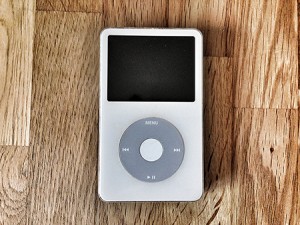Why I loved the iPod Classic
So farewell then, iPod classic. As I write this, it seems that Apple has quietly dropped you from its store. In the process, it’s canned one my favourite products ever – one of my favourite things ever, in fact.
The pitch for the basic iPod is as brilliant now as it was in 2001: ‘1000 songs in your pocket’. Your music, organised into playlists, in a portable and easy-to-use device. Everything since then has been window-dressing.
The second I started using an iPod, my life changed. Really. It was like having a new best friend – one, finally, who understood and appreciated my music, without pride or prejudice.
Invited to shuffle my collection, the iPod proved itself a gifted archivist, finding the perfect Susumu Yokota track to complete a misty autumn morning. It rummaged around old, forgotten albums – and new ones I’d never really listened to – to pull out disregarded tracks that, treated as jukebox singles, suddenly sounded new and fresh.

It was an unashamedly populist DJ, dropping the Dollar and Alphaville classics that would get a cava session with old friends started off with a bang. A carefully curated playlist, combined with the iPod’s ‘life is random’ eclecticism, was the perfect way to mix the surprise of the unexpected track with a deeper consistency of mood. Playlists broke the chains binding me to my CDs, liberating my songs to coalesce around moods, occasions or genres – including those that made sense only to me.
The iPod sent me off to sleep with the gentle sounds of Global Communication, Tim Story or William Orbit, taking me to sonic landscapes created for a single listener. This was a pod you could inhabit, as well as carry: an internal world that was there whenever you needed it.
And because it could do these things, the iPod went everywhere. A new kind of disappointment entered my life – the realisation that I had a spare 15 minutes away from the house, but had forgotten to bring my iPod.
All these experiences were already perfect. They didn’t need improvement. The interface of the iPod simply needed to allow them to happen, as elegantly and unobtrusively as possible. And it did. Before long, scrolling through albums felt as natural as browsing CDs on a shelf.
Gadgetheads are always hungry for novelty. But sometimes, adding means dilution, not increase. I didn’t need my iPod to be a web browser, a PDA or an electronic Pocketeer. Adding a touchscreen and dozens of apps may have improved the technology, but it didn’t improve the core experience.
The purity of the iPod’s design focused your attention on music. The message of this medium was that music wasn’t an accessory, or just another avenue of distraction. It was something important: something that deserved effort and care, and merited its own device.
The end of the iPod isn’t just the end of a much-loved device; it’s the end of a whole way of thinking. The era of the smartphone is the era of ‘everything, all the time’. Even as our attention becomes more fragmented, our experience more granular, we keep adding new distractions, new apps, new devices. (Hello, Apple Watch.) What we really need in our lives, now more than ever, is mindfulness of the moment and pure, simple experiences. The iPod Classic delivered both. I’m going to miss it.
Comments (3)
Comments are closed.
Yep.
Now, suddenly, it feels like the iPod Classic was the last great Apple product. A genuine innovation, beautifully designed, and married to a flawless user experience.
I s’pose you can’t blame manufacturers for chasing tech. It’s what users want (apparently).
But, like you, I loved its purity. It’s willingness to take a backseat. It knew you were there for the music and it didn’t try to change your mind.
Classic indeed.
Just bought my second Classic. Use it at work, in the car, parties great for play lists. Love sticking it on shuffle rediscovering great tracks adding them on the go. Never considered using my smartphone for music.
Best thing about the iPod? Apple can’t suddenly take your music and hide it in the Cloud. I take great care of mine and never update it, which I fear would give Apple a means of rendering it inoperable.